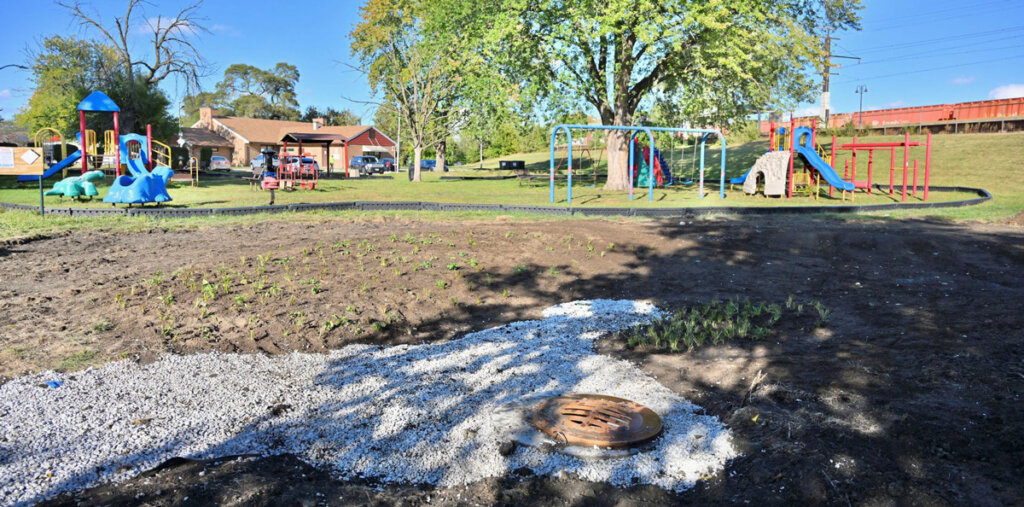Stormwater Credit Trading: 5 years of implementation
co-authored by Hugo Coronado, MPC Associate
Enhancing stormwater regulations to create a more climate-resilient region

The Pekny Park Rain Garden, located in Riverdale, IL, is a prime example of how StormStore can help developers, engineers, and community members work together to solve stormwater management problems.
The flooding events during the summer of 2023 demonstrate that climate change is real and climate action is needed. Regional plans like On to 2050 from CMAP and the Metropolitan Mayor Caucus Climate Action Plan underline flooding and heat as the primary climate threats to our Region. These climate risks increase the need to adapt our infrastructure and policy to today’s challenges. The Metropolitan Water Reclamation District of Greater Chicago (MWRD) has embraced innovation with programs that incentivize investment in stormwater projects. With the implementation of programs like the Stormwater Credit Trading (StormStore), the district incentivizes the development of more capacity, allowing stakeholders to support their efforts to make our region more resilient to extreme weather events.
MWRD has made tremendous investments in large-scale stormwater and flood control projects like the Deep Tunnel, also known as the Tunnel and Reservoir Plan (TARP), to alleviate the pressure on our aging infrastructure. Such infrastructure takes time, and to work efficiently, local sewers must channel their stormwater into the system. However, not all municipalities have the infrastructure to manage extreme weather events effectively. Despite this challenge, our region offers tools that encourage local stormwater projects to alleviate the pressure on their sewer systems.
To address budget constraints that affect investment in municipalities, MWRD has implemented innovative Green Infrastructure solutions to bolster the capacity of municipalities, which can deliver resources to communities on the frontline of climate change. For example, the Green Infrastructure Partnership Program helps increase green infrastructure across our Region by creating a competitive grant program to invest in projects identified by local municipalities. In a similar spirit of innovation, MPC worked with The Nature Conservancy through the StormStore partnership to introduce a market-based approach known as Stormwater Credit Trading. Adopted as a pilot program by MWRD through an amendment to the Water Management Ordinance (WMO), this program is nearing the end of the current experimentation period.
The WMO is part of the backbone of MWRD’s regional stormwater management strategy, outlining stormwater requirements for land development and redevelopment. The WMO can also be a powerful tool for incentivizing landowners to direct new stormwater capacity to be built where it can have the greatest regional impact. Currently operating in two of the six watersheds regulated by the WMO, the pilot has gained momentum with five successful projects—one in Little Calumet and four in Lower Des Plaines. Collectively these projects provide the capacity to address previously unmanaged stormwater in these communities, credits totaling 2.4 ac-ft of detention volume and 0.4 ac-ft of volume control. Municipalities like Riverdale, Niles, River Forest, and Franklin Park, saw the opportunity to be early movers in this space generating credits that can sold or used as incentives to lower future development costs in their communities.
As the end of the pilot period approaches (Dec 21, 2024), MPC is excited for the future for credit trading and other regional tools for prioritizing investment in green infrastructure. One reason for this excitement is a green street project being developed with support from TNC in the Village of Harvey. With construction anticipated to be completed by the end of the pilot, this project will be one of the first credit-generating projects intentionally designed to participate in the pilot and showcase how public-private partnerships can leverage trading to deliver multi-benefit stormwater projects.
Collaborative efforts between the StormStore partners and municipalities holding credits are underway to explore the potential benefits of trading credits beyond their boundaries, thereby expanding opportunities for success. Recognizing that MWRD alone cannot meet all the stormwater capacity needs of a changing climate, tools like the Stormwater Credit Trading program enhance the effectiveness of our WMO by offering alternatives that incentivize the development of additional stormwater infrastructure. By incentivizing communities to expand their capacity and fostering robust outreach efforts to engage private developers, this pilot has the potential to significantly increase resilience across our region, preparing us for the challenges of future extreme weather events.
